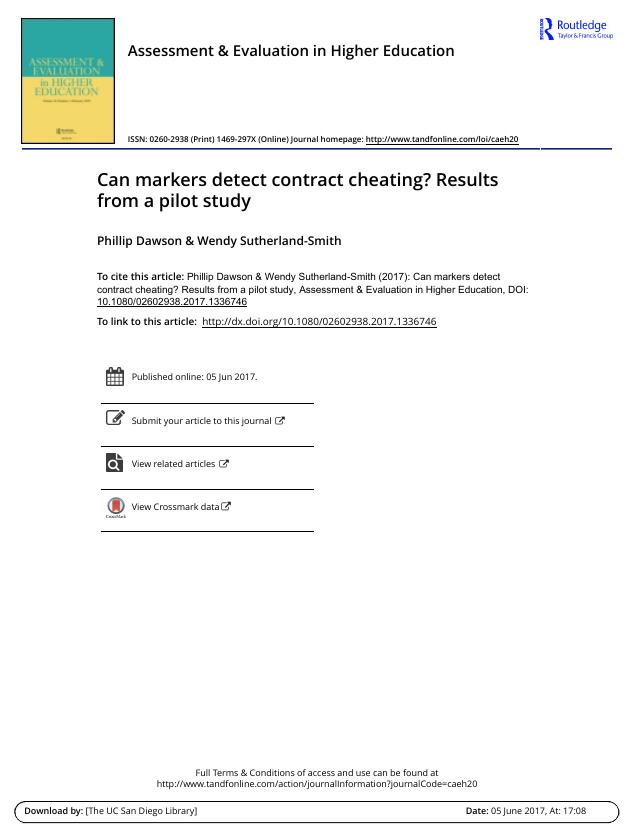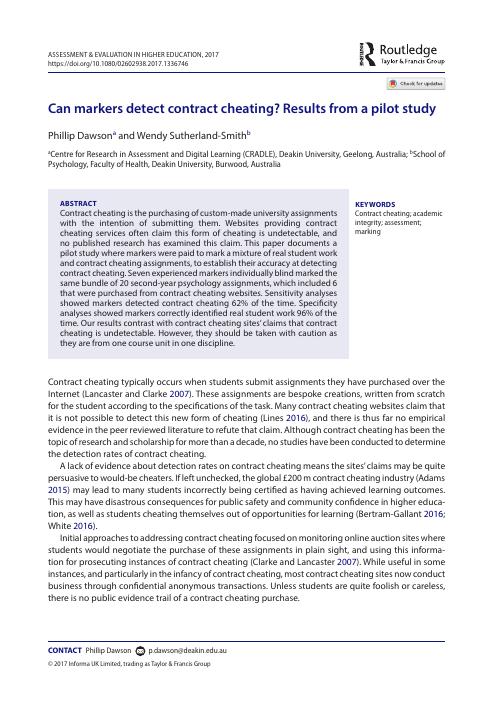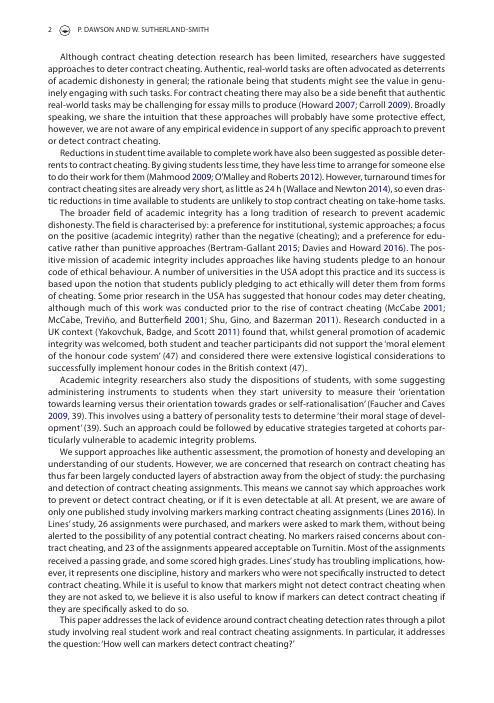Can markers detect contract cheating? Results from a pilot study
A critical review of four scholarly articles on the skills valued by employers in recruitment.
9 Pages6081 Words90 Views
Added on 2023-06-09
About This Document
This paper documents a pilot study where markers were paid to mark a mixture of real student work and contract cheating assignments, to establish their accuracy at detecting contract cheating. Sensitivity analyses showed markers detected contract cheating 62% of the time. Specificity analyses showed markers correctly identified real student work 96% of the time.
Can markers detect contract cheating? Results from a pilot study
A critical review of four scholarly articles on the skills valued by employers in recruitment.
Added on 2023-06-09
ShareRelated Documents
Full Terms & Conditions of access and use can be found at
http://www.tandfonline.com/action/journalInformation?journalCode=caeh20
Download by: [The UC San Diego Library] Date: 05 June 2017, At: 17:08
Assessment & Evaluation in Higher Education
ISSN: 0260-2938 (Print) 1469-297X (Online) Journal homepage: http://www.tandfonline.com/loi/caeh20
Can markers detect contract cheating? Results
from a pilot study
Phillip Dawson & Wendy Sutherland-Smith
To cite this article: Phillip Dawson & Wendy Sutherland-Smith (2017): Can markers detect
contract cheating? Results from a pilot study, Assessment & Evaluation in Higher Education, DOI:
10.1080/02602938.2017.1336746
To link to this article: http://dx.doi.org/10.1080/02602938.2017.1336746
Published online: 05 Jun 2017.
Submit your article to this journal
View related articles
View Crossmark data
http://www.tandfonline.com/action/journalInformation?journalCode=caeh20
Download by: [The UC San Diego Library] Date: 05 June 2017, At: 17:08
Assessment & Evaluation in Higher Education
ISSN: 0260-2938 (Print) 1469-297X (Online) Journal homepage: http://www.tandfonline.com/loi/caeh20
Can markers detect contract cheating? Results
from a pilot study
Phillip Dawson & Wendy Sutherland-Smith
To cite this article: Phillip Dawson & Wendy Sutherland-Smith (2017): Can markers detect
contract cheating? Results from a pilot study, Assessment & Evaluation in Higher Education, DOI:
10.1080/02602938.2017.1336746
To link to this article: http://dx.doi.org/10.1080/02602938.2017.1336746
Published online: 05 Jun 2017.
Submit your article to this journal
View related articles
View Crossmark data

Assessment & evAluAtion in HigHer educAtion, 2017
https://doi.org/10.1080/02602938.2017.1336746
Can markers detect contract cheating? Results from a pilot study
Phillip Dawson a and Wendy Sutherland-Smithb
acentre for research in Assessment and digital learning (crAdle), deakin university, geelong, Australia; bschool of
Psychology, Faculty of Health, deakin university, Burwood, Australia
ABSTRACT
Contract cheating is the purchasing of custom-made university assignments
with the intention of submitting them. Websites providing contract
cheating services often claim this form of cheating is undetectable, and
no published research has examined this claim. This paper documents a
pilot study where markers were paid to mark a mixture of real student work
and contract cheating assignments, to establish their accuracy at detecting
contract cheating. Seven experienced markers individually blind marked the
same bundle of 20 second-year psychology assignments, which included 6
that were purchased from contract cheating websites. Sensitivity analyses
showed markers detected contract cheating 62% of the time. Specificity
analyses showed markers correctly identified real student work 96% of the
time. Our results contrast with contract cheating sites’ claims that contract
cheating is undetectable. However, they should be taken with caution as
they are from one course unit in one discipline.
Contract cheating typically occurs when students submit assignments they have purchased over the
Internet (Lancaster and Clarke 2007). These assignments are bespoke creations, written from scratch
for the student according to the specifications of the task. Many contract cheating websites claim that
it is not possible to detect this new form of cheating (Lines 2016), and there is thus far no empirical
evidence in the peer reviewed literature to refute that claim. Although contract cheating has been the
topic of research and scholarship for more than a decade, no studies have been conducted to determine
the detection rates of contract cheating.
A lack of evidence about detection rates on contract cheating means the sites’ claims may be quite
persuasive to would-be cheaters. If left unchecked, the global £200 m contract cheating industry (Adams
2015) may lead to many students incorrectly being certified as having achieved learning outcomes.
This may have disastrous consequences for public safety and community confidence in higher educa-
tion, as well as students cheating themselves out of opportunities for learning (Bertram-Gallant 2016;
White 2016).
Initial approaches to addressing contract cheating focused on monitoring online auction sites where
students would negotiate the purchase of these assignments in plain sight, and using this informa-
tion for prosecuting instances of contract cheating (Clarke and Lancaster 2007). While useful in some
instances, and particularly in the infancy of contract cheating, most contract cheating sites now conduct
business through confidential anonymous transactions. Unless students are quite foolish or careless,
there is no public evidence trail of a contract cheating purchase.
KEYWORDS
contract cheating; academic
integrity; assessment;
marking
© 2017 informa uK limited, trading as taylor & Francis group
CONTACT Phillip dawson p.dawson@deakin.edu.au
https://doi.org/10.1080/02602938.2017.1336746
Can markers detect contract cheating? Results from a pilot study
Phillip Dawson a and Wendy Sutherland-Smithb
acentre for research in Assessment and digital learning (crAdle), deakin university, geelong, Australia; bschool of
Psychology, Faculty of Health, deakin university, Burwood, Australia
ABSTRACT
Contract cheating is the purchasing of custom-made university assignments
with the intention of submitting them. Websites providing contract
cheating services often claim this form of cheating is undetectable, and
no published research has examined this claim. This paper documents a
pilot study where markers were paid to mark a mixture of real student work
and contract cheating assignments, to establish their accuracy at detecting
contract cheating. Seven experienced markers individually blind marked the
same bundle of 20 second-year psychology assignments, which included 6
that were purchased from contract cheating websites. Sensitivity analyses
showed markers detected contract cheating 62% of the time. Specificity
analyses showed markers correctly identified real student work 96% of the
time. Our results contrast with contract cheating sites’ claims that contract
cheating is undetectable. However, they should be taken with caution as
they are from one course unit in one discipline.
Contract cheating typically occurs when students submit assignments they have purchased over the
Internet (Lancaster and Clarke 2007). These assignments are bespoke creations, written from scratch
for the student according to the specifications of the task. Many contract cheating websites claim that
it is not possible to detect this new form of cheating (Lines 2016), and there is thus far no empirical
evidence in the peer reviewed literature to refute that claim. Although contract cheating has been the
topic of research and scholarship for more than a decade, no studies have been conducted to determine
the detection rates of contract cheating.
A lack of evidence about detection rates on contract cheating means the sites’ claims may be quite
persuasive to would-be cheaters. If left unchecked, the global £200 m contract cheating industry (Adams
2015) may lead to many students incorrectly being certified as having achieved learning outcomes.
This may have disastrous consequences for public safety and community confidence in higher educa-
tion, as well as students cheating themselves out of opportunities for learning (Bertram-Gallant 2016;
White 2016).
Initial approaches to addressing contract cheating focused on monitoring online auction sites where
students would negotiate the purchase of these assignments in plain sight, and using this informa-
tion for prosecuting instances of contract cheating (Clarke and Lancaster 2007). While useful in some
instances, and particularly in the infancy of contract cheating, most contract cheating sites now conduct
business through confidential anonymous transactions. Unless students are quite foolish or careless,
there is no public evidence trail of a contract cheating purchase.
KEYWORDS
contract cheating; academic
integrity; assessment;
marking
© 2017 informa uK limited, trading as taylor & Francis group
CONTACT Phillip dawson p.dawson@deakin.edu.au

2 P. DAWSON AND W. SUTHERLAND-SMITH
Although contract cheating detection research has been limited, researchers have suggested
approaches to deter contract cheating. Authentic, real-world tasks are often advocated as deterrents
of academic dishonesty in general; the rationale being that students might see the value in genu-
inely engaging with such tasks. For contract cheating there may also be a side benefit that authentic
real-world tasks may be challenging for essay mills to produce (Howard 2007; Carroll 2009). Broadly
speaking, we share the intuition that these approaches will probably have some protective effect,
however, we are not aware of any empirical evidence in support of any specific approach to prevent
or detect contract cheating.
Reductions in student time available to complete work have also been suggested as possible deter-
rents to contract cheating. By giving students less time, they have less time to arrange for someone else
to do their work for them (Mahmood 2009; O’Malley and Roberts 2012). However, turnaround times for
contract cheating sites are already very short, as little as 24 h (Wallace and Newton 2014), so even dras-
tic reductions in time available to students are unlikely to stop contract cheating on take-home tasks.
The broader field of academic integrity has a long tradition of research to prevent academic
dishonesty. The field is characterised by: a preference for institutional, systemic approaches; a focus
on the positive (academic integrity) rather than the negative (cheating); and a preference for edu-
cative rather than punitive approaches (Bertram-Gallant 2015; Davies and Howard 2016). The pos-
itive mission of academic integrity includes approaches like having students pledge to an honour
code of ethical behaviour. A number of universities in the USA adopt this practice and its success is
based upon the notion that students publicly pledging to act ethically will deter them from forms
of cheating. Some prior research in the USA has suggested that honour codes may deter cheating,
although much of this work was conducted prior to the rise of contract cheating (McCabe 2001;
McCabe, Treviño, and Butterfield 2001; Shu, Gino, and Bazerman 2011). Research conducted in a
UK context (Yakovchuk, Badge, and Scott 2011) found that, whilst general promotion of academic
integrity was welcomed, both student and teacher participants did not support the ‘moral element
of the honour code system’ (47) and considered there were extensive logistical considerations to
successfully implement honour codes in the British context (47).
Academic integrity researchers also study the dispositions of students, with some suggesting
administering instruments to students when they start university to measure their ‘orientation
towards learning versus their orientation towards grades or self-rationalisation’ (Faucher and Caves
2009, 39). This involves using a battery of personality tests to determine ‘their moral stage of devel-
opment’ (39). Such an approach could be followed by educative strategies targeted at cohorts par-
ticularly vulnerable to academic integrity problems.
We support approaches like authentic assessment, the promotion of honesty and developing an
understanding of our students. However, we are concerned that research on contract cheating has
thus far been largely conducted layers of abstraction away from the object of study: the purchasing
and detection of contract cheating assignments. This means we cannot say which approaches work
to prevent or detect contract cheating, or if it is even detectable at all. At present, we are aware of
only one published study involving markers marking contract cheating assignments (Lines 2016). In
Lines’ study, 26 assignments were purchased, and markers were asked to mark them, without being
alerted to the possibility of any potential contract cheating. No markers raised concerns about con-
tract cheating, and 23 of the assignments appeared acceptable on Turnitin. Most of the assignments
received a passing grade, and some scored high grades. Lines’ study has troubling implications, how-
ever, it represents one discipline, history and markers who were not specifically instructed to detect
contract cheating. While it is useful to know that markers might not detect contract cheating when
they are not asked to, we believe it is also useful to know if markers can detect contract cheating if
they are specifically asked to do so.
This paper addresses the lack of evidence around contract cheating detection rates through a pilot
study involving real student work and real contract cheating assignments. In particular, it addresses
the question: ‘How well can markers detect contract cheating?’
Although contract cheating detection research has been limited, researchers have suggested
approaches to deter contract cheating. Authentic, real-world tasks are often advocated as deterrents
of academic dishonesty in general; the rationale being that students might see the value in genu-
inely engaging with such tasks. For contract cheating there may also be a side benefit that authentic
real-world tasks may be challenging for essay mills to produce (Howard 2007; Carroll 2009). Broadly
speaking, we share the intuition that these approaches will probably have some protective effect,
however, we are not aware of any empirical evidence in support of any specific approach to prevent
or detect contract cheating.
Reductions in student time available to complete work have also been suggested as possible deter-
rents to contract cheating. By giving students less time, they have less time to arrange for someone else
to do their work for them (Mahmood 2009; O’Malley and Roberts 2012). However, turnaround times for
contract cheating sites are already very short, as little as 24 h (Wallace and Newton 2014), so even dras-
tic reductions in time available to students are unlikely to stop contract cheating on take-home tasks.
The broader field of academic integrity has a long tradition of research to prevent academic
dishonesty. The field is characterised by: a preference for institutional, systemic approaches; a focus
on the positive (academic integrity) rather than the negative (cheating); and a preference for edu-
cative rather than punitive approaches (Bertram-Gallant 2015; Davies and Howard 2016). The pos-
itive mission of academic integrity includes approaches like having students pledge to an honour
code of ethical behaviour. A number of universities in the USA adopt this practice and its success is
based upon the notion that students publicly pledging to act ethically will deter them from forms
of cheating. Some prior research in the USA has suggested that honour codes may deter cheating,
although much of this work was conducted prior to the rise of contract cheating (McCabe 2001;
McCabe, Treviño, and Butterfield 2001; Shu, Gino, and Bazerman 2011). Research conducted in a
UK context (Yakovchuk, Badge, and Scott 2011) found that, whilst general promotion of academic
integrity was welcomed, both student and teacher participants did not support the ‘moral element
of the honour code system’ (47) and considered there were extensive logistical considerations to
successfully implement honour codes in the British context (47).
Academic integrity researchers also study the dispositions of students, with some suggesting
administering instruments to students when they start university to measure their ‘orientation
towards learning versus their orientation towards grades or self-rationalisation’ (Faucher and Caves
2009, 39). This involves using a battery of personality tests to determine ‘their moral stage of devel-
opment’ (39). Such an approach could be followed by educative strategies targeted at cohorts par-
ticularly vulnerable to academic integrity problems.
We support approaches like authentic assessment, the promotion of honesty and developing an
understanding of our students. However, we are concerned that research on contract cheating has
thus far been largely conducted layers of abstraction away from the object of study: the purchasing
and detection of contract cheating assignments. This means we cannot say which approaches work
to prevent or detect contract cheating, or if it is even detectable at all. At present, we are aware of
only one published study involving markers marking contract cheating assignments (Lines 2016). In
Lines’ study, 26 assignments were purchased, and markers were asked to mark them, without being
alerted to the possibility of any potential contract cheating. No markers raised concerns about con-
tract cheating, and 23 of the assignments appeared acceptable on Turnitin. Most of the assignments
received a passing grade, and some scored high grades. Lines’ study has troubling implications, how-
ever, it represents one discipline, history and markers who were not specifically instructed to detect
contract cheating. While it is useful to know that markers might not detect contract cheating when
they are not asked to, we believe it is also useful to know if markers can detect contract cheating if
they are specifically asked to do so.
This paper addresses the lack of evidence around contract cheating detection rates through a pilot
study involving real student work and real contract cheating assignments. In particular, it addresses
the question: ‘How well can markers detect contract cheating?’

End of preview
Want to access all the pages? Upload your documents or become a member.
Related Documents
Impact of Contract Cheating on Academic Performance of University Students in Australia | PPTlg...
|9
|607
|15
Commercial Aspects of Contract Cheating - Critical Appraisallg...
|7
|1100
|397
Business and Marketinglg...
|7
|329
|34
